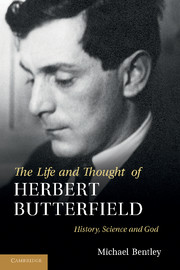Book contents
- Frontmatter
- Contents
- List of illustrations
- Acknowledgements
- List of abbreviations
- Note on manuscript sources
- Introduction
- PART I PRIVATE INTELLECTUAL 1900–1945
- 1 Brontë country
- 2 Peterhouse and Princeton
- 3 Love, marriage and the ‘Sex Question’
- 4 Thinking man's historian
- 5 European civilization and the Third Reich
- 6 Wartime ambiguities
- PART II CONTOURS OF AN ORIGINAL MIND
- PART III PUBLIC INTELLECTUAL 1945–1979
- Further reading
- Index
3 - Love, marriage and the ‘Sex Question’
from PART I - PRIVATE INTELLECTUAL 1900–1945
Published online by Cambridge University Press: 03 May 2011
- Frontmatter
- Contents
- List of illustrations
- Acknowledgements
- List of abbreviations
- Note on manuscript sources
- Introduction
- PART I PRIVATE INTELLECTUAL 1900–1945
- 1 Brontë country
- 2 Peterhouse and Princeton
- 3 Love, marriage and the ‘Sex Question’
- 4 Thinking man's historian
- 5 European civilization and the Third Reich
- 6 Wartime ambiguities
- PART II CONTOURS OF AN ORIGINAL MIND
- PART III PUBLIC INTELLECTUAL 1945–1979
- Further reading
- Index
Summary
… a series of love letters may seem a succession of random follies, unrelated to the realities of life, if read by cold outsiders who had never been in love.
Sex is the devil; and the devil is that one cannot wish it away; if with a word one could banish desire, still that word would be left unsaid.
… we all carry some of our secrets to the grave …
Christian love dominated Butterfield's consciousness and gave his life meaning. It anchored his theology and lent it a deep sense of charity towards sinners; it illuminated his history and turned the practice of historical writing into a form of ethics; it controlled his political views in ways that took him beyond party; it told him how international relations should be configured. Each of these subjects requires our attention. But human love also permeated his dealings with those around him, in his family, his marriage and his relationships with the few people with whom he could feel intimate, and those have a prior claim if one wants to know the man. Like many men marked by profound spirituality, moreover, Butterfield discovered himself to have an urgent sexual need that complemented and implemented his love, one without which he would have felt the poorer, yet one that also brought pain and friction and sometimes left him surrounded by innuendo. What are the ethics of discussing such privacies long after one's subject is dead?
- Type
- Chapter
- Information
- The Life and Thought of Herbert ButterfieldHistory, Science and God, pp. 65 - 94Publisher: Cambridge University PressPrint publication year: 2011



